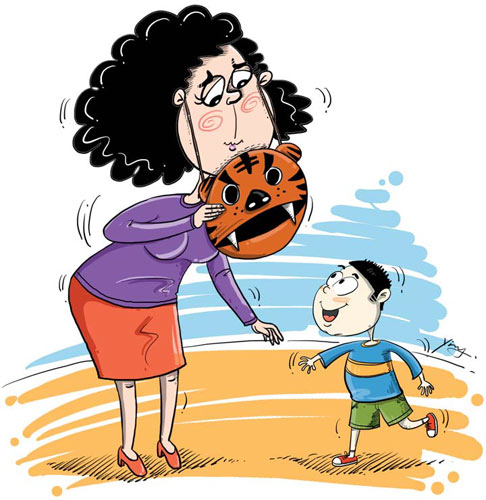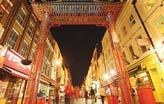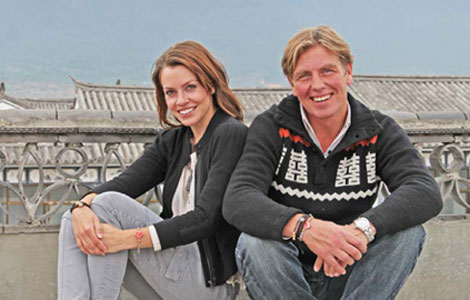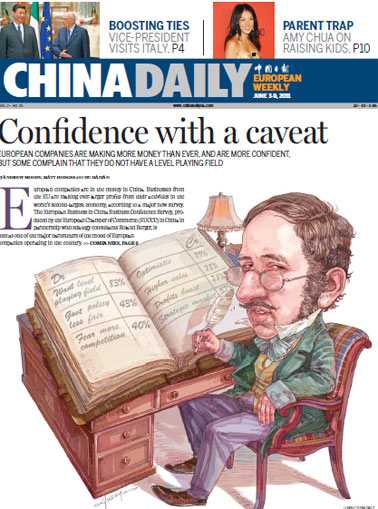Parents need to find the right balance
Updated: 2011-06-03 10:52
By Amy Chua (China Daily European Weekly)
Western parenting gives children too much freedom at too young an age
 |
My book, Battle Hymn of the Tiger Mother, published six months ago, sparked a worldwide controversy turning my life upside down. For a while, I was getting 500 e-mails a day. Some were vicious, but many others were extremely positive and inspiring. The book is being translated into 30 languages - so how best to raise our children is something that worries every parent, no matter which part of the world they are from.
Much of the intense reaction to my book was based on a misunderstanding. Two days before publication, the Wall Street Journal published an excerpt from my book under the headline "Why Chinese mothers are superior" - a headline I did not give and do not agree with. I believe there are many ways of being a good parent, and much depends on the personality of the child in question.
I myself was raised by extremely strict - but also extremely loving - Chinese parents, who arrived in the United States in 1960 as poor graduate students. My parents were very tough with my three sisters and me.
Today, however, I adore my parents and feel utterly grateful to them. I realize how much they always believed in me and how much they sacrificed for me. They gave me extraordinary opportunities - I went to Harvard, and I love my job as a Yale Law professor - and made me proud of Chinese culture and values.
That's why I tried to raise my two daughters the same way. But it wasn't easy. I was in the US, where parenting attitudes are very different. In the US, raising an "obedient" (guai) child is seen as negative and two hours of violin practice is considered abusive by many.
With my elder daughter, Sophia, things went smoothly. But then came my second daughter, Lulu, and I learned my lesson the hard way. Lulu was born with a fiery personality, and at 13, she rebelled. After one terrible fight, I realized I was in danger of losing Lulu forever. So I changed, not completely, though - I refused to compromise on academic excellence and other things. But I let Lulu give up the violin to play tennis instead, and I allowed her to follow her own passions.
Ironically, compared with many parents in China, I might not even be considered very strict. My husband is Jewish-American, and he always insisted that my daughters got a lot of fun and freedom. My book is not a parenting guide but a memoir - the story of my own search as a mother to find a balance between the best of Eastern and Western cultures.
Interestingly, when it comes to child rearing I think the East and the West have opposite problems. So perhaps what the Chinese can learn from my book is the opposite of what Westerners can.
In general, I think Western parenting gives children too much freedom at too young an age. The average American child spends almost 70 percent more time watching television than attending school. In the recent PISA international tests, the US came out an embarrassing 23rd in science and 34th in math - with Shanghai children ranked No 1. Western children have alarming rates of alcohol and drug abuse and teenage pregnancy, too. On the other hand, American universities continue to be the envy of the world, and the US excels at teaching creativity, innovation and leadership.
What are the lessons for China then? Here are a few things China may be able to learn from the West.
First, while children in the West have too much choice, their counterparts in China may have too little. Among school, tutoring and lessons, many Chinese children work nonstop, getting little opportunity to have fun with friends, explore on their own and discover what they truly enjoy. What I learned is that as children grow up, parents should listen to their choices more carefully and gradually give them more freedom to pursue their own passions.
Second, Chinese parents should pay more attention to their children's individual personalities. Every child is different. So depending on children's natural predispositions, different career paths will make them happy. Some people may find it more fulfilling to become a photographer or fashion designer instead of a doctor. If Chinese parents become more open-minded in what they consider "success", it may help lessen the intense competition and pressure that many Chinese children feel.
Finally, Chinese parents are good at getting their children to memorize, practice, and drill - skills I believe the West needs more of - but they should also find ways to encourage creativity and initiative. My daughters were lucky because my husband taught them the value of independent thinking. He always asked "why". Just because someone told you so, how do you know it's right?
Parenting is the hardest job I've ever had. Many of my critics haven't actually read my book and don't realize that I wrote it in a moment of crisis, when Lulu rebelled and I began questioning everything I'd done.
I feel very lucky that I adjusted in time - today my daughters and I are close friends - and I wanted to share my story with other mothers, because we are all struggling with the same problem: how can we raise happy, strong and self-reliant children? I don't have the answer, but I will continue my search combining the best of East and West.
The author is a professor at Yale Law School and has the famous book, Battle Hymn of the Tiger Mother, to her credit.
E-paper

Tapping into the future
Foreign companies are investing in China's water industry as many predict a growing profit margin.
Preview of the coming issue
Headhunters ride on growth
Commercial property rides wave
Specials

Cuisine central
London's Chinatown is helping diners appreciate full palate of Chinese food

Tying the knot
Danish couple's high-end macrame export business takes off in the mountains of Yunnan.

Truly a super woman
Li Yuchun first came to prominence in 2005 as the Super Girl winner, and since then has become an international star.
